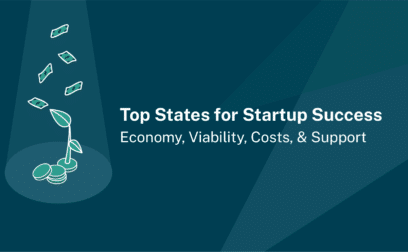TABLE OF CONTENTS
There are many ways to finance a franchise. You can borrow money from your 401(k) account, dip into personal savings, or ask friends and family for help. But one of the best ways to get business funding is through an SBA loan.
SBA loans are offered by banks and online lenders, and are generally appealing because they have low-interest rates and are guaranteed by the federal government.
If you want an SBA loan for your franchise, keep reading. We’ll cover the different types of SBA loans available for franchises, the key steps and processes to apply for an SBA loan, and alternative financing options for your franchise.
Page written by Zoe Weisner. Last reviewed on August 12, 2024. Next review due October 1, 2026.

The most popular SBA loans for franchises are the SBA 7(a) loans and the SBA 504/CDC loan. Both loan programs are excellent choices for franchise owners for their long terms and lower rates. Learn more about each type of SBA loan below.
With a limit of $5 million, terms of up to 25 years, and the ability to customize the loan for multiple purposes, the SBA 7(a) loan is one of the best commercial business loans in its category. Franchise owners can use an SBA 7(a) loan for debt refinancing, equipment purchase, and leasing real estate. The SBA 7(a) loan also has no prepayment penalties and generally does not require any down payment.
Borrowers will have to consider that SBA 7(a) loans have variable interest rates adjusted quarterly. This can make the 7(a) loan less or more appealing depending on the interest rate set by the feds. Additionally, the 7(a) loan requires borrowers to pledge all available collateral.
The SBA 504 loan is primarily used for real estate purposes or machinery and equipment. These loans are offered through Certified Development Companies (CDCs), which are SBA partners that manage economic development within local communities. If your primary objective is to purchase an entire building or land for your franchise, an SBA 504 loan is your best bet. The SBA 504 loan is usually attractive to small business owners for its low fixed rates and downpayment, which hovers around 10%.
The maximum limit for a 504 loan is $5 million. Payment terms range from 10 to 20 years, but in some cases, you can extend your term up to 25 years.
To work out the monthly repayments of your loan, use our SBA loan calculator here.
The most essential step to applying for an SBA loan is to ensure that you meet the qualification requirements. Business owners with little franchise experience will likely have difficulty securing an SBA loan. With that said, here are six steps to apply for an SBA loan as a franchisee.
To find out if your franchise is eligible for SBA financing, you’ll need to review the SBA Franchise Directory. The SBA will only finance your franchise if it is under their approved list of franchises and other brands.
If you do not find your franchise in the directory, you can submit a franchise or brand to the SBA Franchise Team if you are interested in getting your franchise in the SBA Franchise Directory.
Because SBA loans are highly sought after, the most important step to applying for an SBA loan is to ensure you meet their business eligibility requirements. This includes credit score, business experience, and collateral.
Requirements vary depending on the type of loan product you are interested in, but prospective borrowers should expect a credit score of around 680 to 700 to qualify and have relevant business management experience or transferable skills to run a franchise. While you may not necessarily need franchise experience, SBA lenders are looking for borrowers who have the ability to generate a profitable business.
Lastly, you’ll most likely have a better chance of getting an SBA loan if you have some sort of asset with equity.
Unless you plan on purchasing real estate for your franchise, it’s recommended that for general-purpose funding, an SBA 7(a) loan will cover most of your franchising needs. As mentioned earlier, a 504/CDC loan can be used to finance commercial equipment, but in most cases, it’s designed for large real estate purchases or renovations.
To apply for an SBA loan, you’ll need to find an SBA-approved lender. It’s important to note that every lender has different requirements. Some lenders may focus more on the amount of collateral you offer, while others are more cash-flow-focused. Fortunately, you can apply to multiple lenders for an SBA 7(a) or 504 loans as long as you meet the SBA’s lending guidelines.
Whether you’re looking to refurbish, expand, or purchase an existing franchise, Swoop has dedicated franchise financing experts who can help you find financing for your business. Simply sign up and answer a few questions on Swoop to book an appointment with a franchise funding expert.
The most tedious and time-consuming part of the SBA application is filling out and gathering relevant documentation. These are the most important pieces of paperwork you’ll need for your SBA loan application:
If you are planning on purchasing an existing business, you’ll have to provide additional documentation such as the previous tax returns of the purchased business, bill of sales, and asking price with the schedule of inventory, machinery and equipment, and furniture.
Once you’ve submitted your application and documents, it will take one to two months for the lender to prepare a loan agreement. After the loan agreement is signed, funding will take roughly two weeks. You will most likely need to answer additional questions and requests from the lender during the closing period.
If an SBA loan is not the right fit for you, worry not. There are several other financing options for your franchise. Here are a few other ways you can finance your franchise.
If you have savings in your retirement accounts, you may be able to take out money to fund your franchise. Financing your franchise with a 401(k) can be a good option because there may be significant tax advantages depending on your state tax rate. You can use as much pre-tax money as you want to finance your franchise and even pay yourself a salary.
Keep in mind that the money you use from your retirement savings is a risk and can result in a permanent loss of your retirement funds.
An unsecured line of credit is another option for borrowers looking for quick financing that doesn’t have very stringent qualification requirements. Generally, an unsecured line of credit doesn’t require collateral, cash injections, or a business plan.
Online lenders typically offer unsecured lines of credit. These lenders tend to have higher interest rates than traditional bank loans and have shorter terms.
Zoe is an experienced content marketer and freelance writer. For the past five years, she has written for several high-profile fintech startups such as BlueVine, Fundera, and Nerdwallet to help small business owners navigate through the world of small business financing. Today, Zoe writes about small business finance, business operations, and personal finance.
Swoop promise
At Swoop we want to make it easy for SMEs to understand the sometimes overwhelming world of business finance and insurance. Our goal is simple – to distill complex topics, unravel jargon, offer transparent and impartial information, and empower businesses to make smart financial decisions with confidence.
Find out more about Swoop’s editorial principles by reading our editorial policy.
Related pages
Daire made it happen! There is no doubt that Swoop sped up the process and found lenders that worked to our time scale rather than the other way round
Hocque Figureoa
Joint owner, F45 Virginia
Swoop was actually very helpful in helping us get our initial fundraising in place. Swoop was able to connect us with investors, with grant financing options and debt financing options.
Viler Lika
Founder, SingleKey
Pedja was amazing. Super supportive, understanding of our needs and wasn't pushy at all. We've been going back and forth with Swoop for over a year inquiring about different financing options and they were patient until we were ready!
Chris Skeates
F45 Multi-studio owner
Join the 95,000+ businesses just like yours getting the Swoop newsletter.
Free. No spam. Opt out whenever you like.
Kingfisher Way, Silverlink Business Park, Newcastle upon Tyne, NE28 9NX, UK
View in Google Maps35 Bull Street, Lewis Building, Birmingham B4 6AF, UK
View in Google MapsAberystwyth Innovation and Enterprise Campus
Gogerddan Campus
Aberystwyth University
Ceredigion
SY23 3EE
Dogpatch Labs, The CHQ Building, Custom House Quay, Dublin, Ireland
View in Google MapsSuite 801, Level 8, 84 Pitt Street, Sydney, NSW 2000, Australia
View in Google Maps43 W 23rd St, New York, NY 10010, United States
View in Google Maps21 Dreyer Street, Cape Town, South Africa, 7708
View in Google MapsClever finance tips and the latest news
Delivered to your inbox monthly
Join the 95,000+ businesses just like yours getting the Swoop newsletter. Free. No spam. Opt out whenever you like.




